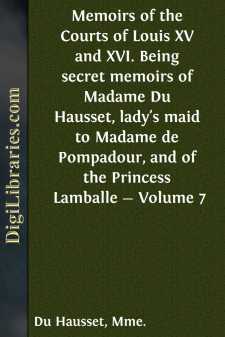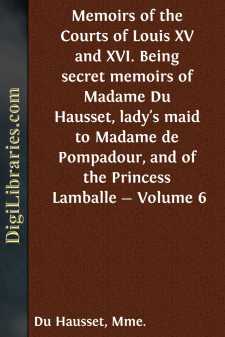History
- Africa 30
- Americas (North Central South West Indies) 50
- Ancient 68
- Asia 58
- Australia & New Zealand 8
- Canada 41
- Caribbean & West Indies 1
- Civilization 20
- Eastern Europe 12
- Europe 310
- Expeditions & Discoveries 60
- General 77
- Historical Geography 1
- Jewish 9
- Latin America 3
- Medieval 8
- Middle East 13
- Military 248
- Revolutionary 8
- Study & Teaching 5
- United States 353
- Western Europe 56
- World 13
History Books
Sort by:
by:
Mme. Du Hausset
Editor in continuation: I am again, for this and the following chapter, compelled to resume the pen in my own person, and quit the more agreeable office of a transcriber for my illustrious patroness. I have already mentioned that the Princesse de Lamballe, on first returning from England to France, anticipated great advantages from the recall of the emigrants. The desertion of France by so many of the...
more...
by:
Mme. Du Hausset
"The dismissal of M. Necker irritated the people beyond description. They looked upon themselves as insulted in their favourite. Mob succeeded mob, each more mischievous and daring than the former. The Duc d'Orleans continued busy in his work of secret destruction. In one of the popular risings, a sabre struck his bust, and its head fell, severed from its body. Many of the rioters (for the...
more...
by:
Archibald Alison
JOURNEY TO PARIS. We passed through Kent in our way to France, on Sunday the first of May 1814. This day's journey was very delightful. The whole scenery around us,—the richness of the fields and woods, then beginning to assume the first colours of spring; the extent and excellence of the cultivation; the thriving condition of the towns, and the smiling aspect of the neat and clean villages...
more...
by:
Robert Black
CHAPTER I. GAUL. The Frenchman of to-day inhabits a country, long ago civilized and Christianized, where, despite of much imperfection and much social misery, thirty-eight millions of men live in security and peace, under laws equal for all and efficiently upheld. There is every reason to nourish great hopes of such a country, and to wish for it more and more of freedom, glory, and prosperity; but one...
more...
by:
Charles Kingsley
PREFACE The rules of the Royal Institution forbid (and wisely) religious or political controversy. It was therefore impossible for me in these Lectures, to say much which had to be said, in drawing a just and complete picture of the Ancien Régime in France. The passages inserted between brackets, which bear on religious matters, were accordingly not spoken at the Royal Institution. But more. It...
more...
by:
Charles Morris
THE HUNS AT ORLEANS. On the edge of a grand plain, almost in the centre of France, rises a rich and beautiful city, time-honored and famous, for it stood there before France had begun and while Rome still spread its wide wings over this whole region, and it has been the scene of some of the most notable events in French history. The Gauls, one of whose cities it was, named it Genabum. The Romans...
more...
THE CONSULATE (1799-1804). For more than ten years, amid unheard of shocks and sufferings, France had been seeking for a free and regular government, that might assure to her the new rights which had only been gained through tribulation. She had overthrown the Monarchy and attempted a Republic; she had accepted and rejected three constitutions, all the while struggling single-handed with Europe,...
more...
by:
Robert Black
CHAPTER XVII. THE CRUSADES, THEIR DECLINE AND END. In the month of August, 1099, the Crusade, to judge by appearances, had attained its object. Jerusalem was in the hands of the Christians, and they had set up in it a king, the most pious and most disinterested of the crusaders. Close to this ancient kingdom were growing up likewise, in the two chief cities of Syria and Mesopotamia, Antioch and Edessa,...
more...
by:
Robert Black
CHAPTER XXIII.——THE HUNDRED YEARS' WAR—CHARLES VI. AND THE DUKES OF BURGUNDY. Sully, in his Memoirs, characterizes the reign of Charles VI. as "that reign so pregnant of sinister events, the grave of good laws and good morals in France." There is no exaggeration in these words; the sixteenth century with its St. Bartholomew and The League, the eighteenth with its reign of terror, and...
more...
by:
Robert Black
CHAPTER XXXV. HENRY IV., PROTESTANT KING. (1589-1593.) On the 2d of August, 1589, in the morning, upon his arrival in his quarters at Meudon, Henry of Navarre was saluted by the Protestants King of France. They were about five thousand in an army of forty thousand men. When, at ten o'clock, he entered the camp of the Catholics at St. Cloud, three of their principal leaders, Marshal d'Aumont,...
more...











